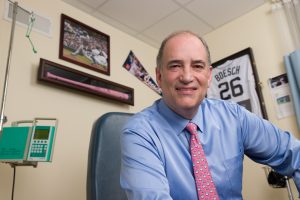
Cape Cod Oncologist Victor Aviles, MD: Offering Hope to Cancer Patients, Ballplayers, and Many More
Dr. Victor Aviles, a compassionate Cape Cod oncologist bringing hope and advanced cancer care to the community.
HIPAA Alert: Potential Data Breach Learn More
Questions on Oncology, Hematology and/or Infusion Clinical Services due to COVID-19 Crisis – CALL 833-698-1623
Important Information for Our Patients Regarding the Coronavirus.
RCCA Providing Area Cancer Patients with Access to Care During Coronavirus Outbreak
RCCA Offering Patients Virtual Visits During Coronavirus Pandemic
Learning that you or a loved one has cancer can be overwhelming at any time, but needing cancer care while America contends with the COVID-19 crisis adds a whole new set of concerns to an already challenging situation..
“Patients understandably are worried about whether their cancer or its treatment may weaken their immune system, making them more susceptible to contracting coronavirus. Many also are hesitant to come to a healthcare facility for consultation or treatment, due to concerns about potentially being near people who are carrying the virus,” notesIuliana Shapira, MD, the Chief Medical Officer of Regional Cancer Care Associates, LLC, or RCCA, one of the nation’s largest networks of oncologists.
The board-certified medical oncologist and hematologist adds that RCCA not only understands those concerns, but has taken several steps to address them at its 28 care centers throughout New Jersey, Connecticut, Maryland, Pennsylvania and the Washington, DC area. In a recent interview, Drs. Shapira and Denis Fitzgerald, Board Chairperson of RCCA, outlined RCCA’s approach to providing comprehensive care in the midst of the coronavirus outbreak – including offering virtual “telehealth” visits whenever appropriate – and offered some reassuring perspective to patients with cancer.
Dr. Fitzgerald, a board-certified medical oncologist and hematologist who practices at RCCA’s Little Silver, NJ offices, said, “I think it’s helpful for people with cancer to keep three facts in mind during these unsettling times.” He continued:
Dr. Shapira added that RCCA has extensive operational expertise in protecting patient health. “All we do is cancer and hematologic care. The only patients we see are those with cancer or hematologic conditions, and our offices and processes are designed with those people’s specific needs in mind.Much of what we do to enhance the patient experience is readily apparent, such as the convenience of being able to park just outside the front door of a community clinic, be greeted by a receptionist who knows you, and quickly be taken to an exam room. But a significant portion of our patient-focused approach goes on ‘behind the scenes,’ such as the rigorous processes we employ for regularly sanitizing every room, space and piece of medical equipment in our offices,” she said.
Dr. Fitzgerald noted that RCCA has taken several steps in response to the coronavirus, including:
“We will continue to adjust as needed during the coronavirus outbreak to protect our patients, their families, and our staff,” the physician said. He added, “While it’s important to change approaches in step with evolving circumstances, one thing that won’t change is our commitment to providing patients with the care they need when they need it. RCCA’s doctors, nurses, and other team members are here for people with cancer, whether you’ve just been diagnosed, are in the midst of treatment, or have completed active treatment and have a question or need follow-up care. If you have specific concerns, call your RCCA office and we will address them. Oncologists devote their careers to seeing people with cancer through the worst of times, and – together – we’ll get through this trying time, as well.”
With more than 80-plus cancer specialists practicing at more than 20 care centers located throughout Connecticut, Maryland, New Jersey and the Washington, DC area, RCCA provides care to roughly 22,000 new cancer patients and 225,000 established patients each year. RCCA offers those patients immunotherapy, targeted treatment, cell-based therapy and other cutting-edge treatments and diagnostic modalities, as well as access to clinical trials.
For more information or to schedule an appointment,
call 844-346-7222. You can also schedule an appointment by calling the RCCA location nearest you.

Dr. Victor Aviles, a compassionate Cape Cod oncologist bringing hope and advanced cancer care to the community.

The 20th Annual Hope Music Fest, presented by the Hope Community Cancer Center division of Regional Cancer Care Associates (RCCA), returns for a night filled

In 2011, community-based cancer specialists were celebrating rapidly improving developments for their patients. But at the same time, the outlook for their practices was less

Regional Cancer Care Associates is one of fewer than 200 medical practices in the country selected to participate in the Oncology Care Model (OCM); a recent Medicare initiative aimed at improving care coordination and access to and quality of care for Medicare beneficiaries undergoing chemotherapy treatment.